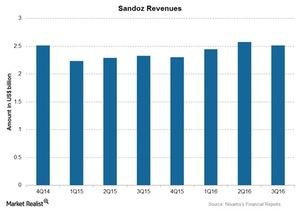How Did Novartis’s Generics Business Perform in 3Q16?
Sandoz reported a decline of 1% in 3Q16 revenues at constant exchange rates.
Jan. 17 2017, Updated 9:06 a.m. ET

Sandoz, the generics segment
Sandoz, the generics arm of Novartis (NVS), is the number two generic medicines provider worldwide and number one in differentiated generics, which includes products difficult to develop and manufacture. For 3Q16, Sandoz contributed ~20.8% of total revenues at $2.5 billion.
Sandoz reported a decline of 1% in 3Q16 revenues at constant exchange rates. The operational growth was driven by a 5% increase in volumes, substantially offset by a 6% decline due to price erosion.
Performance of Sandoz products
The revenue drivers for Sandoz are biopharmaceuticals including biosimilars and Glatopa. Growth was reported across all regions worldwide. For US markets, a 4% decline in revenues to $917 million was reported during 3Q16. The Western European region reported a 3% growth in revenues at constant exchange rates to $706 million, driven by strong growth in France, Switzerland, the Netherlands, and Italy. Central and Eastern Europe revenues rose by around 9% at constant exchange rates to $276 million during 3Q15, driven by increased sales in Russia.
Biopharmaceuticals
The global sales of biopharmaceuticals rose 41% at constant exchange rates to $262 million. These include revenues from biosimilars, biopharmaceutical contract manufacturing, and Glatopa. The growth came mainly from three in-market biosimilars including Omnitrope, Binocrit, and Zarzio, as well as the strong performance of Glatopa and Zarxio in US markets. Glatopa is the first generic version of Teva Pharmaceutical’s (TEVA) Copaxone 20mg used for the treatment of relapsing forms of multiple sclerosis.
Anti-infective franchise
The anti-infective franchise reported a 2% decrease in revenues at constant exchange rates to $339 million for 3Q16. Sandoz discontinued low-margin products, which led to an overall decline in the franchise revenues.
Investors can consider ETFs like the PowerShares International Dividend Achievers ETF (PID), which holds ~1.1% of its total assets in Novartis, 2.3% in GlaxoSmithKline (GSK), and 1.4% in Sanofi (SNY), in order to divest the risk.
